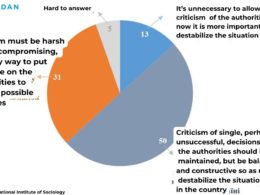A large majority of Ukrainians — 84% — believe there is no systematic discrimination or restriction of rights against Russian-speaking citizens in Ukraine. Among Russian-speaking Ukrainians themselves, 81% share this view.
These findings are based on a new survey conducted by the Kyiv International Institute of Sociology (KIIS).
According to KIIS sociologists, although some differences in views remain between regions and between Ukrainian and Russian speakers, the situation has become much more balanced since Russia’s full-scale invasion in 2022.
Currently, 63% of respondents report speaking Ukrainian at home. Russian language is used by 13%, while 19% say they use both languages equally.
Compared to 2020, the share of those speaking Ukrainian at home has risen from 52% to 63%, while the share speaking only Russian has declined from 25% to 13%.
Regionally, the use of Ukrainian remains highest in Western Ukraine, where 85% of respondents spoke it at home both in 2020 and 2025.
In Central Ukraine, the share of Ukrainian speakers grew from 62% to 68%, while Russian speakers dropped from 16% to 11%.
The South and East saw the most notable shifts: in the South, Ukrainian use at home increased from 22% to 39%, and in the East, from 17% to 29%.
Additionally, 81% of respondents oppose granting Russia any official status, either nationwide or within their own region.





